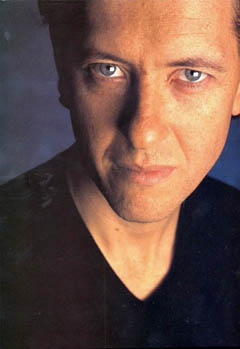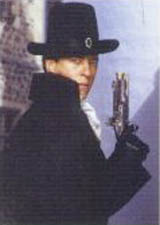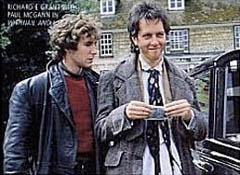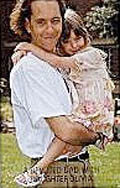How to Get Ahead – IN LIFE
Sainsbury’s Magazine – November/December 2000.
Feature written by Garry Jenkins.
 Back in the colonial Africa of Richard E Grant’s childhood, the local Swazi tribesmen used to call his father Mathlaganipar: ‘man whose thoughts run faster than his feet’. Today, he’s a world away from the bush, on the set of BBC’s The Scarlet Pimpernel, in the ancient town of Cutna Hora, east of Prague. Grant, however, is a clearly a chip off the old block.
Back in the colonial Africa of Richard E Grant’s childhood, the local Swazi tribesmen used to call his father Mathlaganipar: ‘man whose thoughts run faster than his feet’. Today, he’s a world away from the bush, on the set of BBC’s The Scarlet Pimpernel, in the ancient town of Cutna Hora, east of Prague. Grant, however, is a clearly a chip off the old block.
It is not that he is slow on his feet. Despite the burning sun, he is rushing around the 14th-century courtyard set, checking details with the director here, chatting to a continuity person there. From the moment he bounds up to the café where we are to conduct our conversation, however it is clear that – like his father before him – he has a mind that turns at an even swifter rate of knots. The Swazi would probably call him ‘man who tries to pack an hour into every minute of his life’. It is little wonder his Hollywood pal Steve Martin’s nickname for him is Relentless.
“I am driven. I like to get as much from every day as if it is my last,” Grant says matter-of-factly, settling his six feet two inch frame in a shaded spot and declaring that he has an hour’s lunch break. “I could be run over by a bus after lunch.” Grant has been holed up in the Czech Republic for the best part of four months. “As with most human beings, you find something to grumble about. But you get well paid, you get watered, fed and looked after. I’m not stuck in the middle of the Russian wastelands unable to go home to England for 17 months, which I think would be reason to bleat. No, it’s very civilised,” he says of the experience.
He is here to reprise his most popular television role, the foppish Sir Percy Blakeney, aka The Scarlet Pimpernel. Today, he is disguised as a peasant rosette salesman. His normally urbane appearance has been transformed by a battered hat, a ragged suit, a rat-infested wig and, most gruesome of all, blackened teeth. “It’s universally popular because we all have a version of who we think we are, which is different to how the world perceives us,” he explains.
 “It comes as no surprise to discover that Grant has been living a double life of his own during the shoot. At the end of the day, he heads back to his hotel to begin another eight-hour shift producing his own movie, an intriguingly titled period drama, Wah-wah. Each night he fine-tunes the script, fires off e-mails and conducts conference calls with the film’s backers in the UK and America. “It’s autobiographical of my childhood experience of colonial society at the end of the sixties going through independence,” he explains. “The title, Wah-wah, comes from how an American woman identified the way upper-class English people speak. She says they’re all speaking ‘wah-wah’, saying things like ‘toodle-pip’ and ‘tiddlywink’ and ‘brouhaha’, and she doesn’t have a clue what they are talking about.”
“It comes as no surprise to discover that Grant has been living a double life of his own during the shoot. At the end of the day, he heads back to his hotel to begin another eight-hour shift producing his own movie, an intriguingly titled period drama, Wah-wah. Each night he fine-tunes the script, fires off e-mails and conducts conference calls with the film’s backers in the UK and America. “It’s autobiographical of my childhood experience of colonial society at the end of the sixties going through independence,” he explains. “The title, Wah-wah, comes from how an American woman identified the way upper-class English people speak. She says they’re all speaking ‘wah-wah’, saying things like ‘toodle-pip’ and ‘tiddlywink’ and ‘brouhaha’, and she doesn’t have a clue what they are talking about.”
Most conversational roads led back to Africa at some point. If his roots hold the key to his future as a director and screenwriter, they hold an even greater significance in explaining the past and what it is exactly that makes Richard E Grant run. Richard Grant Esterhuyseen grew up in Mbabane, the capital of Swaziland, where his father Henrik was Minister of Education. The young Richard’s theatrical instincts first showed themselves at the age of eight when he made theatres out of shoe boxes and wrote and performed his own plays.
The seminal movement of his childhood came soon after, however. When he was nine his mother Leonie announced she was leaving to set up home with a South African mining engineer. He admits he was more bewildered than embittered by the loss. “Well, it was hard for her too.” His mother’s absence strengthened the ties to a father he already adored and who now took on the task of caring for him and his brother Stuart single-handedly.
Grant remained close to his father and traveled to Cape Town for his education. After university, he did his bit to undermine apartheid in South Africa by setting up his own multi-racial troupe.
 It was the traumatic loss of his father, who died from a brain tumour, aged just 51, in 1982, that severed Grant’s link to the continent of his birth. He headed for London six months later, his only remainder of Africa a watch bequeathed to him by Henrik. It is one of two watches he wears at all time. Regardless of where he is in the world, his father’s timepiece is always set to Swazi time.
It was the traumatic loss of his father, who died from a brain tumour, aged just 51, in 1982, that severed Grant’s link to the continent of his birth. He headed for London six months later, his only remainder of Africa a watch bequeathed to him by Henrik. It is one of two watches he wears at all time. Regardless of where he is in the world, his father’s timepiece is always set to Swazi time.
His early days in London were spent waiting tables and working at the London Actors’ Centre. His almost demonic drive ensured he did not remain in obscurity for long, however. Ask him where that drive comes from and he says, “Ignoble revenge on all the people who said; ‘You’ll never make it.’” There is no doubt either that his father’s premature death had added to his determination to squeeze every ounce of experience out of every day. It was at the London Actors’ Centre that the final – most important – piece of the jigsaw fell into place, however. It was there that he met his wife, Joan Washington.
In the past, Grant has admitted that his reluctance to commit to a relationship was rooted in his fear of suffering the trauma his father bore. “I was convinced that if I ever trusted anybody with my heart, I would run the risk of having it broken, so I shied away from relationships,” he said once. “but then I was lucky enough to fall in love with the right person, who wiped away any doubts.”
Washington, a dialect coach eight years his senior, approached him for help with a Zulu accent. They have remained inseparable ever since. After losing their first child, a girl, Tiffany, within an hour of her birth, the couple had another daughter, Olivia, in 1988. The family now live near the Thames in southwest London.
Joan’s influence on his career is subtle but significant. Three years into their relationship, in 1985, it was she, crucially, who encouraged him to go for the part of a raddled, alcoholic, out-of-work actor in Withnail and I. The film became an instant cult classic and made him a star. Since then he has starred in a succession of films, from hits like How to Get a Ahead in Advertising and Dracula, to misses like Hudson Hawk and Prêt a Porter. In recent years he has added to his reputation as one of the smarter actors around by penning two books. With Nails, a bestselling collection of entries from diaries he has kept since teenage years, and a novel, By Design.
Grant’s writing – like his acting – is fuelled by a cocktail of curiosity and insecurity. The time he spent in Hollywood in the early Nineties proved perfect material. “I lived there for a year and a half doing one job after another,” he says. “The moment you’re not working there it changes, though.
In any other city in the world you can say, ‘I am an actor and I’m currently unemployed.’ In Los Angeles, it’s like saying you’ve got leprosy,” he adds straight-faced. “It’s true. So you have to act that you’ve got something ‘in development’, I’ve seen people bankrupt themselves. You think they’re driving smart cars and eating in restaurants, but they’ve got themselves in hock. That’s no way to live.”
For a brief while, Grant found himself falling into Hollywood void. “A producer said, ‘You should do some body-building and turn yourself into muscle-bound leading men.” I looked in the mirror and knew I was never going to be Schwarzenegger. It was a ridiculous notion,” he says, running an eye down his 11-stone frame. “I left for the sake of me sanity.”
Apart from the isolation he dislikes the essential infidelity of the movie industry. He admits that he has received more than his fair share of fan mail. “Sometimes they are Niagara-like in their gush,” he roars. “I probably hold fidelity in far higher esteem than I might have done if my parents had not divorced,” he says. “But to me it just defeats the purpose of being with someone if you’re going to be a philanderer.”
Instead, he headed but to London where he poured the LA experience into a novel, By Design. “It was truth transmuted into fiction,” he says with a wolfish grin. It would, he says, be a mistake to imagine he achieved any of his success by design. “I wish I could be that worked out. But the fact is I’m not,” he says.
 By way of illustration, he describes the choice he was faced with a few years back when he had the chance of two roles in different films: Robert Altman’s star-studded comedy set in the world of Paris fashion, Prêt a Porter, and a low-budget Australian film about a group of transvestites driving across the outback, Priscilla Queen of the Desert. “The choice went like this: do I go with a director who has had one film that nobody went to see, have my legs shaved, my crotch tucked, and wear false eyelashes in 95-degree heat in a bus in the Australian outback for seven weeks? Or would I rather be with Julia Roberts and Sophia Loren in Paris among all the fashion totty with Robert Altman?” he says, still wincing at the memory.
By way of illustration, he describes the choice he was faced with a few years back when he had the chance of two roles in different films: Robert Altman’s star-studded comedy set in the world of Paris fashion, Prêt a Porter, and a low-budget Australian film about a group of transvestites driving across the outback, Priscilla Queen of the Desert. “The choice went like this: do I go with a director who has had one film that nobody went to see, have my legs shaved, my crotch tucked, and wear false eyelashes in 95-degree heat in a bus in the Australian outback for seven weeks? Or would I rather be with Julia Roberts and Sophia Loren in Paris among all the fashion totty with Robert Altman?” he says, still wincing at the memory.
“I thought there is no huge choice here, but how wrong I was. I wouldn’t have missed the experience of working on Prêt a Porter for anything. But Priscilla Queen of the Desert is an ongoing, cult sleeper hit, Prêt a Porter went to the nearest bin. You just don’t know.”
His move into writing and now directing is – in part – insurance against a repeat of such mistakes. “I do think the more you are around, the more people get cheesed off seeing your mug,” he says honestly. “I heard an actor saying about someone who seems to be in everything: ‘It’s about time we didn’t see him for a while.’ You think, if an actor’s saying that, what’s anybody else saying?”
Whatever the future holds, it is hard to imagine the drive dissipating. As well as Wah-wah, Grant is in line to star in a film in Australia, Hildenbrand, to be filmed soon. Mention of the monicker Steve Martin has given him draws a smile. “Relentless, yes,” he says. “He knows I preserve, I don’t give up, don’t shut up until I’m beaten down.”
An assistant director arrives to ask him back before the cameras. He takes his leave, returns the peasant’s hat to his head and sets off for the courtyard. Under the late afternoon sun, the assistant is soon struggling to keep up.
AT A GLANCE
1957 Richard E Grant was born in Mbabane, Swaziland on 5 May.
1982 He arrived in London, working as a waiter as well as appearing in theatre roles.
1987 His career was transformed by his performance in Withnail and I.
1991 He appeared in LA Story with Steve Martin.
1993 Grant was in Martin Scorsese’s The Age of Innocence.
1996 His first book, With Nails: The Film Diaries of Richard E Grant was published.
1997 He appeared in Spice World: The Movie and starred in Keep The Aspidistra Flying with Helena Bonham-Carter.
1998 His first novel By Design was published.
1999 The first series of The Scarlet Pimpernel was aired.








